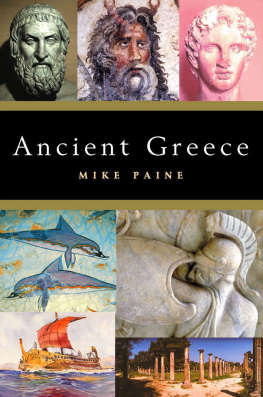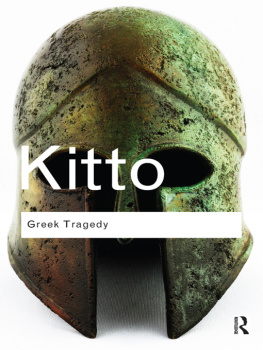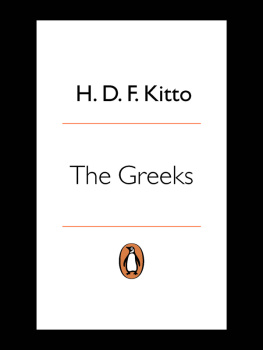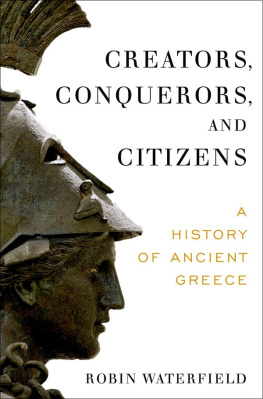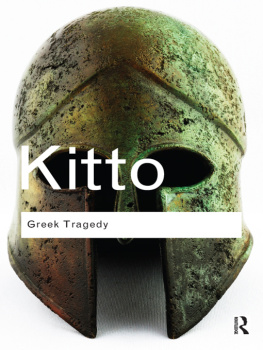H. D. F. Kitto was born in 1897, in Stroud, Gloucestershire. He attended the Crypt Grammar School where, as he always said, he was cajoled by a determined headmaster into doing Classics and was grateful ever more. He continued his education as Lecturer in Greek at the University of Glasgow from 1920 to 1944, when he became Professor of Greek at the University of Bristol. He was made Professor Emeritus at Bristol in 1962.
His publications include Greek Tragedy, Form and Meaning in Drama, Sophocles: Dramatist and Philosopher and translations into English verse of Sophodess Antigone, Electra and Oedipus Rex . As a young man he had travelled extensively in Greece, and he wrote a highly praised book about it, In the Mountains of Greece .
Professor Kitto was married, and had two children. He died in January 1982. In his obituary, The Times said of his books: All were informed by an intellectual integrity, wit and a vigorous prose style. But he will be particularly remembered for The Greeks , his remarkable introduction to Classical Greece, a volume which has had and continues to have, a persuasive influence on students approaching Classical Greek studies for the first time.
THE GREEKS
___________
H. D. F. Kitto

PENGUIN BOOKS
PENGUIN BOOKS
Published by the Penguin Group
Penguin Books Ltd, 80 Strand, London WC2R 0RL , England
Penguin Putnam Inc., 375 Hudson Street, New York, New York 10014, USA
Penguin Books Australia Ltd, 250 Camberwell Road, Camberwell, Victoria 3124, Australia
Penguin Books Canada Ltd. 10 Alcorn Avenue, Toronto, Ontario, Canada M4V 3B2
Penguin Books India (P) Ltd, 11 Community Centre, Panchsheel Park, New Delhi 110 017, India
Penguin Books (NZ) Ltd, Cnr Rosedale and Airborne Roads, Albany, Auckland, New Zealand
Penguin Books (South Africa) (Pty) Ltd, 24 Sturdee Avenue. Rosebank 2196, South Africa
Penguin Books Ltd, Registered Offices: 80 Strand, London WC2R 0RL , England
www.penguin.com
First published in Pelican Books 1951
Reprinted with revisions 1957
Published in Penguin Books 1991
19
Copyright 1951 by H. D. F. Kitto
Copyright H. D. F. Kitto, 1957
All rights reserved
Except in the United States of America, this book is sold subject
to the condition that it shall not, by way of trade or otherwise, be lent,
re-sold, hired out, or otherwise circulated without the publishers
prior consent in any form of binding or cover other than that in
which it is published and without a similar condition including this
condition being imposed on the subsequent purchaser
978-0-14-193721-2
CONTENTS
Map
I
INTRODUCTION
T HE reader is asked, for the moment, to accept this as a reasonable statement of fact, that in a part of the world that had for centuries been civilized, and quite highly civilized, there gradually emerged a people, not very numerous, not very powerful, not very well organized, who had a totally new conception of what human life was for, and showed for the first time what the human mind was for. This statement will be amplified and, I hope, justified in what follows. We can begin the amplification now by observing that the Greeks themselves felt, in quite a simple and natural way, that they were different from any other people that they knew. At least, the Greeks of the classical period habitually divided the human family into Hellenes and barbarians. The pre-classical Greek, Homer for instance, does not speak ofbarbarians in this way; not because he was more polite than his descendants, but because this difference had not then fully declared itself.
It was not, in fact, a matter of politeness at all. The Greek word barbaros does not mean barbarian in the modern sense; it is not a term of loathing or contempt; it does not mean people who live in caves and eat their meat raw. It means simply people who make noises like bar bar instead of talking Greek. If you did not speak Greek you were a barbarian, whether you belonged to some wild Thracian tribe, or to one of the luxurious cities of the East, or to Egypt, which, as the Greeks well knew, had been a stable and civilized country many centuries before Greece existed. Barbaros did not necessarily imply contempt. Many Greeks admired the moral code of the Persians and the wisdom of the Egyptians. The debt material, intellectual and artistic which the Greeks owed to the peoples of the East was rarely forgotten. Yet these people were barbaroi, foreigners, and classed with (though not confused with) Thracians, Scythians and such. Only because they did not talk Greek? No; for the fact that they did not talk Greek was a sign of a pro-founder difference: it meant that they did not live Greek or think Greek either. Their whole attitude to life seemed different; and a Greek, however much he might admire or even envy a barbarian for this reason or that, could not but be aware of this difference.
We may note in passing that one other race (not counting ourselves) has made this sharp distinction between itself and all other foreigners, namely the Hebrews. Here were two races, each very conscious of being different from its neighbours, living not very far apart, yet for the most part in complete ignorance of each other and influencing each other not at all until the period following Alexanders conquests, when Greek thought influenced Hebraic thought considerably as in Ecclesiastes . Yet it was the fusion of what was most characteristic in these two cultures the religious earnestness of the Hebrews with the reason and humanity of the Greeks which was to form the basis of later European culture, the Christian religion. But Gentile and Barbaros were very different conceptions; the one purely racial and religious, the other only incidentally racial and not in the least religious. What then led the Greek to make this sharp division? And had it any justification?
It would be one answer, a true and sufficient one, to say that while the older civilizations of the East were often extremely efficient in practical matters and, sometimes, in their art not inferior to the Greeks, yet they were intellectually barren. For centuries, millions of people had had experience of life and what did they do with it? Nothing. The experience of each generation (except in certain purely practical matters) died with it not like the leaves of the forest, for they at least enrich the soil. That which distils, preserves and then enlarges the experience of a people is Literature. Before the Greeks, the Hebrews had created religious poetry, love-poetry, and the religious poetry and oratory of the Prophets, buc literature in all its other known forms (except the novel) was created and perfected by the Greeks. The difference between barbarian historical chronicles and Thucydides is the difference between a child and a man who can not only understand, but also make his understanding available to others. Epic poetry, history and drama; philosophy in all its branches, from metaphysics to economics; mathematics and many of the natural sciences all these begin with the Greeks.
Yet if we could ask an ancient Greek what distinguished him from the barbarian, he would not, I fancy, put these triumphs of the Greek mind first, even though he was conscious that he set about most things in a more intelligent way. (Demosthenes, for example, rating his fellow-citizens for their spineless policy towards Philip of Macedon, says You are no better than a barbarian trying to box. Hit him in one spot, and his hands fly there; hit him somewhere else, and his hands go there.) Nor would he think first of the temples, statues and plays which we so jusdy admire. He would say, and in fact did say, The barbarians are slaves; we Hellenes are free men.



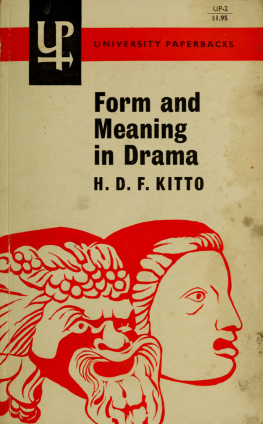
![Michael Lovano - The World of Ancient Greece: A Daily Life Encyclopedia [2 Volumes]](/uploads/posts/book/268736/thumbs/michael-lovano-the-world-of-ancient-greece-a.jpg)

